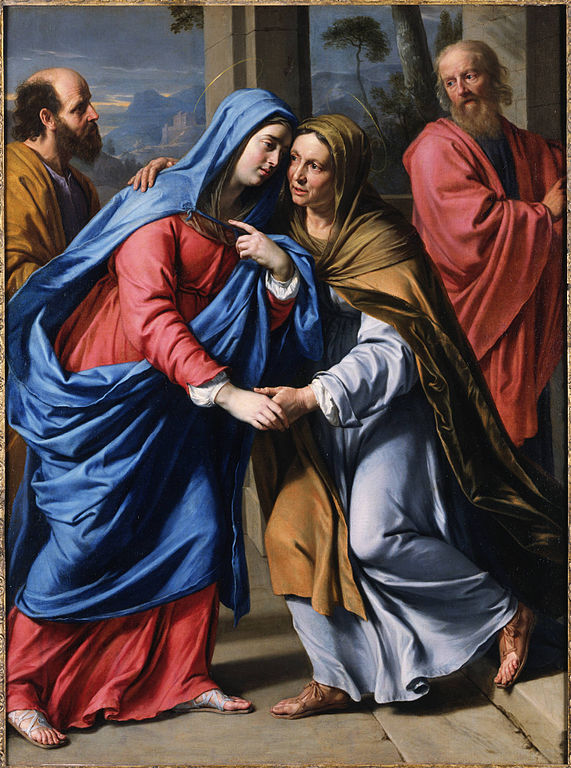 by Theresa Cavicchio
by Theresa Cavicchio“During those days Mary set out and traveled to the hill country in haste to a town of Judah, where she entered the house of Zechariah and greeted Elizabeth” (Lk 1:39).
As we close out the month of May, the month of Our Lady, we celebrate a Marian feast that affords much food for contemplation, both on a spiritual and a very human level.
Pondering our opening citation from the Gospel of Saint Luke, our eyes focus on the words “in haste.” In his Gospel reflection on this passage, Bishop Robert Barron offers valuable insight: “Why did [Mary] go with such speed and purpose? Because she had found her mission, her role in the theo-drama … the great story being told by God, the great play being directed by God. [Mary] has found her role – indeed a climactic role – in the theo-drama, and she wants to conspire with Elizabeth, who has also discovered her role in the same drama.”
So it was that several major players in the “theo-drama” of salvation history came together at Ein Karem, a village in the hills not far from Jerusalem. To place this extraordinary meeting in context, we do well to explore the backstory that sets the stage.
The account of the Annunciation describes the Angel Gabriel’s appearance to Mary, announcing that she had been chosen by God as the mother of His Son, whom she was to name Jesus (Lk 1:26 – 38). The angelic encounter which had preceded it, however, is somewhat less familiar: the heavenly visitor sent to Zechariah, husband of Mary’s cousin Elizabeth (1:5 – 25).
While fulfilling his role as priest of the great Jerusalem Temple, Zechariah had been visited by Gabriel and gifted with a stunning announcement of his own. His wife Elizabeth, “advanced in years” and childless after many years of marriage, would give birth to a son to be named John. Because Zechariah reacted with disbelief, the angel informed him that he would be rendered mute “until the day these things take place” (1:18 – 20).
To resume our account, Mary, already informed of Elizabeth’s pregnancy of six months by the Angel Gabriel, traveled 90 miles from Nazareth to Ein Karem to visit her cousin.
In his book, Praying the Rosary Like Never Before, Edward Sri describes Mary’s arrival: “Imagine the meeting of these two expectant mothers. What joy and excitement they have for each other. Elizabeth rushes out to greet Mary, saying, ‘Blessed are you among women, and blessed is the fruit of your womb!’ (Lk 1:42). Filled with the Holy Spirit, Elizabeth recognizes that of all the women who have ever lived, Mary is most blessed, for the child in her womb is not any ordinary son but the Son of God himself.”
We see the Holy Spirit at work in Elizabeth and also in the reaction of the baby John, leaping in his mother’s womb at Jesus’ presence -- the fulfillment of the Angel Gabriel’s prophecy concerning Elizabeth’s unborn child: “He will be filled with the holy Spirit, even from his mother’s womb” (Lk 1:15).
The joy of that initial meeting surely endured over the course of Mary’s three-month stay at Ein Karem. What were her inmost thoughts when she learned of the circumstances which had rendered Zechariah mute? Did she marvel at the knowledge that “her” Angel Gabriel had visited Zechariah as well?
Mary and Elizabeth would have had many opportunities for shared conversations. Separated from her own mother, Mary may have looked to Elizabeth as a surrogate during her first trimester of pregnancy – one with very recent personal experience. Both women carried sons whose names had been delivered to them by God’s own messenger as chosen by Him. Did these expectant mothers confide to each other their conjectures as to their sons’ God-given roles?
On a very human, feminine level, did Mary share with Elizabeth some thoughts about Joseph, her husband? What insights might Elizabeth have given Mary for a successful marriage?
Scripture doesn’t confirm Mary’s presence at the birth of John the Baptist (Lk 1:57 – 79), but it is reasonable to surmise that her stay of three months would have kept her at Elizabeth’s side for comfort and support during childbirth. In that case, Mary would have joined with others as the newborn baby was named John, celebrating with his parents in wonder as Zechariah, “filled with the Holy Spirit,” recovered his voice in prophecy to proclaim the Benedictus.
The Benedictus, or Canticle of Zechariah, has endured over the centuries; it is prayed worldwide each day during the Morning Prayer of the Church in the Liturgy of the Hours (Lk 1:67 – 79). This joy-filled hymn praises God for fulfillment of His age-old promise of a Messiah (Jesus), and predicts the role of His forerunner (John).
The beautiful language of the Canticle’s conclusion stirs our hearts, lifting them up in hope: “In the tender compassion of our God, the dawn from on high shall break upon us, to shine on those who dwell in darkness and the shadow of death, and to guide our feet into the way of peace.”
In his book Nourishing Love: A Franciscan Celebration of Mary, Murray Bodo, OFM, writes regarding the two expectant mothers: “In [Mary] and Elizabeth, they already knew, were boys, whose tiny feet would one day walk upon the earthen floor that their extraordinary lives would transcend when, as men, they would begin the redemption of Israel.”
As major players in the theo-drama of salvation history, Jesus, Mary, Elizabeth, Zechariah, and John the Baptist fulfilled their God-given roles as inspired by the most major player of all – as “filled with the Holy Spirit.”
© All Rights Reserved, Living His Life Abundantly®/Women of Grace® http://www.womenofgrace.com
